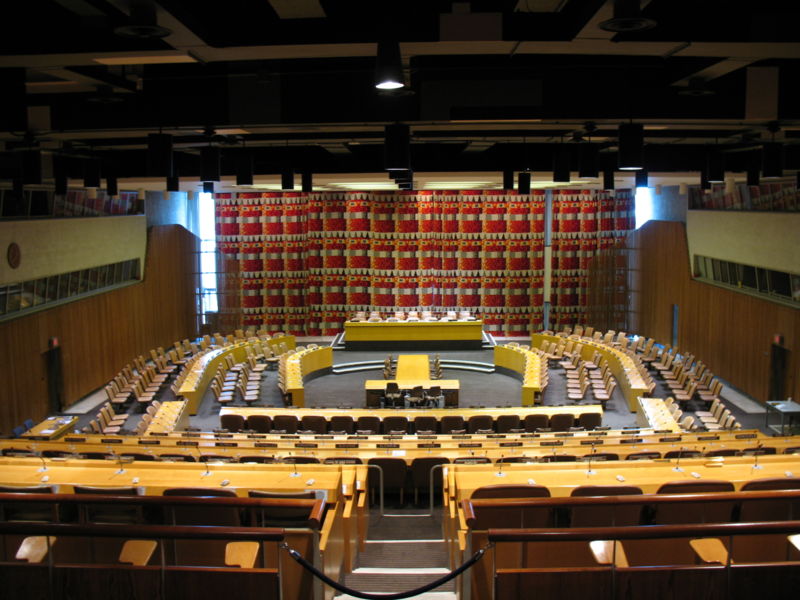<Back to Index>
- United Nations Economic and Social Council, 1945
PAGE SPONSOR

The Economic and Social Council (ECOSOC) of the United Nations constitutes one of the six principal organs of the United Nations and it is responsible for the coordination of the economic, social and related work of 14 UN specialized agencies, its functional commissions and five regional commissions. ECOSOC has 54 members and holds one substantive session each year, in July, for a duration of four weeks. Since 1998, it has also held a meeting each April with finance ministers heading key committees of the World Bank and the International Monetary Fund (IMF).
The
ECOSOC serves as the central forum for discussing international
economic and social issues, and for formulating policy recommendations
addressed to Member States and the United Nations system.
Chamber
The Economic and Social Council Chamber in the United Nations Conference Building was a gift from Sweden. It was conceived by the Swedish architect Sven Markelius, one of the 11 architects in the international team that designed the UN Headquarters. Swedish pine wood has been used around the delegates area, and for the railings and doors.A
special feature of the room are the exposed pipes and ducts in the
ceiling above the public gallery. The architect believed that anything
useful could be left uncovered. The "unfinished" ceiling is commonly
seen as a symbolic reminder that the economic and social work of the
United Nations never finishes; there will always be something more that
can be done to improve the living conditions of the world's people.
President
The president is elected for an one - year term and chosen among the small or middle powers represented on ECOSOC.
Members
The Council has 54 member states which are elected by the United Nations General Assembly for
overlapping three - year terms. Seats on the Council are based on
geographical representation with fourteen allocated to African States,
eleven to Asian States, six to Eastern European States, ten to Latin
American and Caribbean States, and thirteen to Western European and
other States.
Functional commissions
- UN Commission for Social Development
- UN Commission on Human Rights (UNCHR): Disbanded 2006, replaced by the United Nations Human Rights Council (UNHRC), a subsidiary organ of the General Assembly.
- Commission on Narcotic Drugs
- Commission on Crime Prevention and Criminal Justice
- Commission on Science and Technology for Development (CSTD)
- Commission on Sustainable Development (CSD)
- UN Commission on the Status of Women (UN CSW)
- Commission on Population and Development
- UN Statistical Commission
- United Nations Forum on Forests
Regional commissions
- United Nations Economic Commission for Europe (ECE)
- United Nations Economic Commission for Africa (ECA)
- United Nations Economic Commission for Latin America and the Caribbean (ECLAC)
- United Nations Economic and Social Commission for Asia and the Pacific (ESCAP)
- United Nations Economic and Social Commission for Western Asia (ESCWA)
Specialized agencies
The Specialized Agencies are autonomous organizations working with the United Nations and each other, inter alia through the coordinating machinery of the Economic and Social Council.
- International Labour Organization (ILO)
- Food and Agriculture Organization (FAO)
- United Nations Educational, Scientific and Cultural Organization (UNESCO)
- World Health Organization (WHO)
- World Bank Group
- International Monetary Fund (IMF)
- International Civil Aviation Organization (ICAO)
- International Maritime Organization (IMO)
- International Telecommunication Union (ITU)
- Universal Postal Union (UPU)
- World Meteorological Organization (WMO)
- World Intellectual Property Organization (WIPO)
- International Fund for Agricultural Development (IFAD)
- United Nations Children's Fund (UNICEF)
- United Nations Industrial Development Organization (UNIDO)
- United Nations Development Programme (UNDP)
- United Nations Office of Project Services (UNOPS)
- International Refugee Organization (IRO – ceased to exist in 1952)
- International Narcotics Control Board (INCB)
Other entities
- United Nations Permanent Forum on Indigenous Issues (UNPFII)
- Sessional and Standing Committees Expert, ad hoc and related bodies
- United Nations International Children's Emergency Fund (UNICEF)
'The World Economic and Social Survey 2011: The Great Green Technological Transformation'
In a report issued in early July, 2011, the UN body called for spending nearly 2 trillion dollars on green technologies to prevent what it termed “a major planetary catastrophe,” warning that "It is rapidly expanding energy use, mainly driven by fossil fuels, that explains why humanity is on the verge of breaching planetary sustainability boundaries through global warming, biodiversity loss, and disturbance of the nitrogen - cycle balance and other measures of the sustainability of the earth’s ecosystem.”
UN Secretary - General Ban Ki-moon added
“rather than viewing growth and sustainability as competing goals on a
collision course, we must see them as complementary and mutually
supportive imperatives." The report concluded that "Business as usual
is not an option."